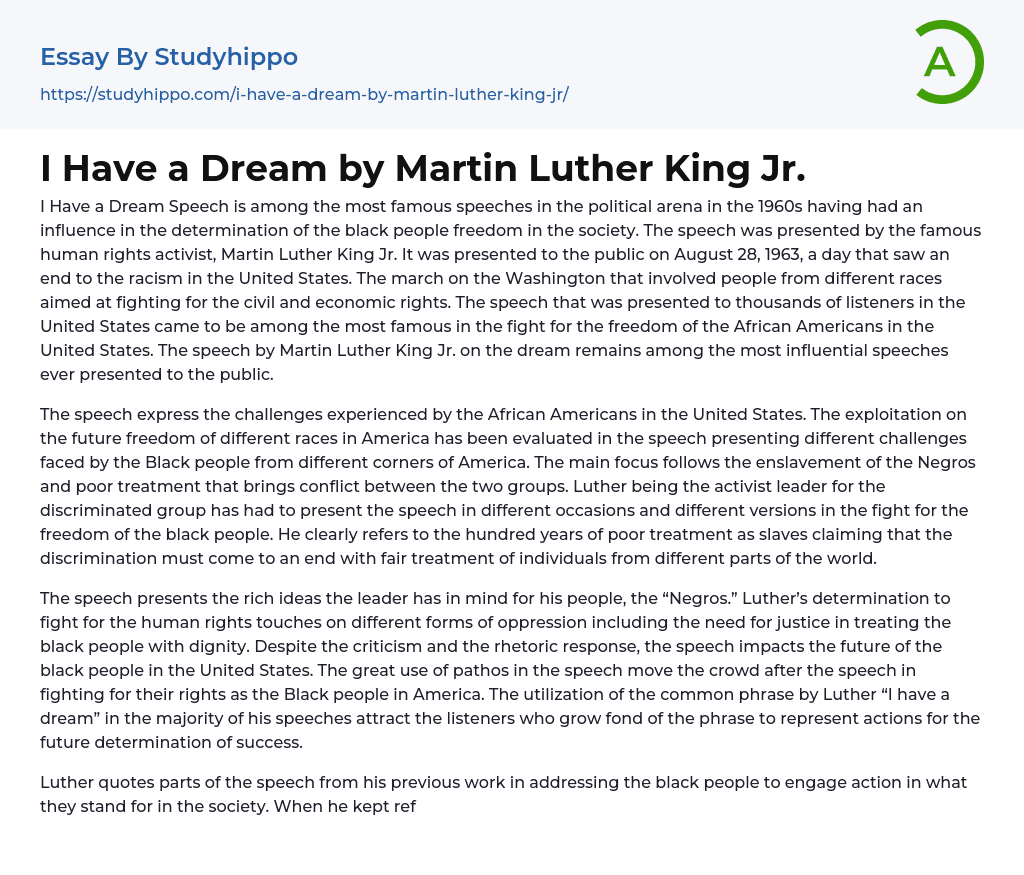The I Have a Dream Speech, which occurred in the 1960s political landscape, is widely recognized and praised. It played a pivotal role in empowering black individuals and securing their freedom within society.
The speech by Martin Luther King Jr., a renowned human rights activist, was given on August 28, 1963, a momentous day that symbolized the elimination of racism in the United States. The March on Washington brought together people from various backgrounds who were striving for both civil and economic rights. Delivered to a wide American audience, King's speech became one of the most celebrated pleas for African American freedom ever uttered. Echoing his vision, it continues to be a persuasive and meaningful discourse.
The speech addresses the challenges faced by African Americans in the United States, highlighting how different difficulties are encountered by Black people
...from all over the country. The primary focus is on the enslavement and mistreatment of Black individuals, leading to conflict between them and other groups. Luther, as the leader of the oppressed group, has delivered various versions of this speech multiple times while advocating for the freedom of Black people. He emphasizes that discrimination endured by slaves throughout a century must end and calls for fair treatment of individuals from all parts of the world. The speech underscores Luther's deep ideas for his own community, the "Negros," and his unwavering determination to fight for their human rights. Various forms of oppression including justice and dignity in how Black people are treated are addressed.
Despite facing criticism and receiving a rhetorical response, the speech leaves a lasting impact on the future of African Americans in the United States. The skillful use
of pathos in Luther's oration motivates the audience to advocate for their rights as Black individuals in America. Luther consistently incorporates the well-known phrase "I have a dream" throughout his speeches, which deeply resonates with listeners and represents their determination to attain future accomplishments. Furthermore, Luther alludes to his prior writings when connecting with the black community and urging them to actively pursue their beliefs within society.
The audience was moved by the message when the speaker repeatedly referred to the dream, demonstrating the effects of ethos in the delivery of the speech. The mention of a future where his children would live in freedom symbolized the social freedom that all black listeners desired at that time. By comparing the years of African servitude to Caucasians, Luther motivated the crowd to pay attention to his speech on freedom. Luther's powerful and convincing speech resonated with the audience because it emphasized issues that were relevant to them. The expression of future hopes and aspirations for equality through the speech evoked an emotional desire for freedom.
In summary, the speech appears to be free from any logical errors regarding inequality. Instead, it is a motivational discourse skillfully tailored to resonate with the audience. The strategic use of ethos captures the audience's attention and leaves them feeling inspired. The incorporation of pathos and ethos adds even more force to the speech, particularly in the realm of politics, as it greatly influences the listeners.
- Antisemitism essays
- Black History Month essays
- Black Lives Matter essays
- I Have a Dream essays
- Ku Klux Klan essays
- Malcolm X essays
- Martin Luther King essays
- Miscegenation essays
- Racial Inequality essays
- Racial Segregation essays
- Free Speech essays
- Freedom Of Speech essays
- Gettysburg Address essays
- Informative Speech essays
- Persuasive Speech essays
- Public Speaking essays




